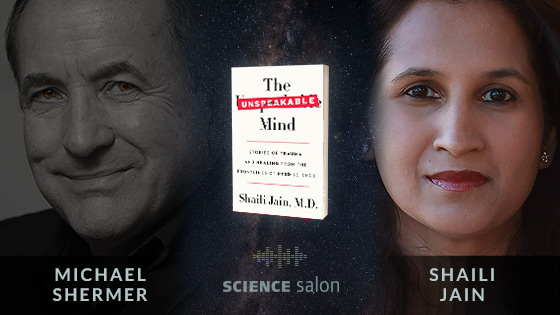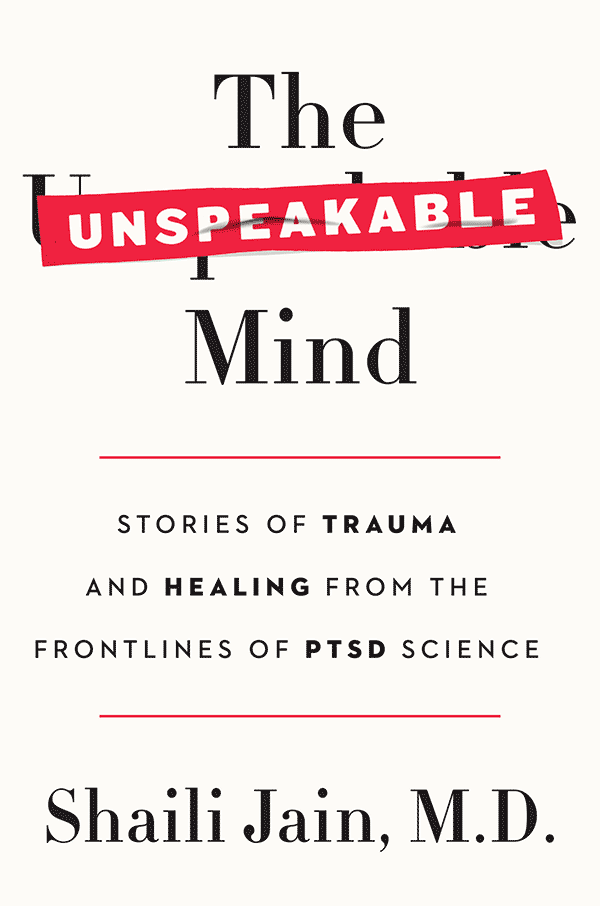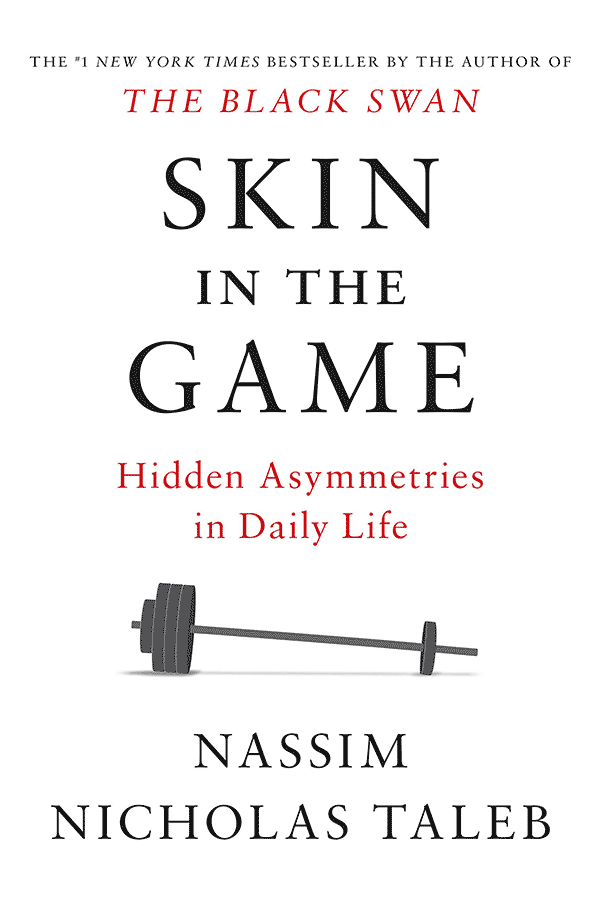SCIENCE SALON # 74
Michael Shermer with Shaili Jain, M.D. — The Unspeakable Mind: Stories of Trauma and Healing from the Frontlines of PTSD Science
From a physician and post-traumatic stress disorder specialist comes a nuanced cartography of PTSD, a widely misunderstood yet crushing condition that afflicts millions of Americans.
The Unspeakable Mind is the definitive guide for a trauma-burdened age. With profound empathy and meticulous research, Shaili Jain, M.D. — a practicing psychiatrist and PTSD specialist at one of America’s top VA hospitals, trauma scientist at the National Center for PTSD, and a Stanford Professor — shines a long-overdue light on the PTSD epidemic affecting today’s fractured world.
Post-Traumatic Stress Disorder goes far beyond the horrors of war and is an inescapable part of all our lives. At any given moment, more than six million Americans are suffering with PTSD. Dr. Jain’s groundbreaking work demonstrates the ways this disorder cuts to the heart of life, interfering with one’s capacity to love, create, and work — incapacity brought on by a complex interplay between biology, genetics, and environment. Beyond the struggles of individuals, PTSD has a tangible imprint on our cultures and societies around the world.
In this conversation Dr. Shermer and Dr. Jain discuss:
- the history of PTSD and why no one talked about it after WWI, WWII, and Vietnam, but now we are
- how Dr. Jain diagnoses PTSD by characteristics presented by a patient
- how to treat PTSD through Cognitive Behavior Therapy through systematic desensitization
- the problem of tracking rates of PTSD because of the expanding bin of who is considered a victim of the disorder
- the difficulty of predicting deaths by suicide
- the difficulty of predicting who will suffer from PTSD, given the many people who have suffered severe trauma and not developed it
- why some stress is good for developing resiliency in life, but when too much stress causes harm, and
- the unseen costs of war.
Listen to the podcast via Apple Podcasts, Spotify, Google Podcasts, Stitcher, iHeartRadio, and TuneIn.
Check Us Out On YouTube.
Science Salons • Michael Shermer
Skeptic Presents • All Videos
You play a vital part in our commitment to promote science and reason. If you enjoy the Science Salon Podcast, please show your support by making a donation.

Chris Edwards reviews Skin in the Game: Hidden Asymmetries in Daily Life by Nassim Nicholas Taleb. This review appeared in Skeptic magazine 23.4 (2018). Photo above: Taleb circa 1980, from his website.
Dead Weight
Sometimes you can judge a book by its cover. The image under the title of Nassim Nicholas Taleb’s new book, Skin in the Game: Hidden Asymmetries in Daily Life, presents the would-be reader with a barbell holding large weights on one side and smaller weights on the other. The mixed metaphor (one might expect to see a reference to skin and/or a game) sets the tone for an uneven book that’s heavy on personal attacks and vendettas but light on substance.
Taleb achieved authorial fame with 2008’s Black Swan, and followed that work with Antifragile in 2012. The first book showed how models based on predictive analytics can fail dramatically when unlikely events occur that crash the system. It became popular in no small part because of the financial crisis in the housing sector that occurred the same year. It’s not clear what the connection was, though, since the housing crash came as a result of consistent flaws in the lending system and not as a singular unlikely event. Antifragile put forth the thesis that universities exist to formalize ideas and processes that actually evolved in the wild where real people work.
Skin in the Game stems from these books. Taleb’s new thesis is that people who make decisions and predictions should share in the pain and/or rewards that come as an outcome of those decisions. In the Introduction, he writes “If you have the rewards, you must also get some of the risks, not let others pay the price of your mistakes. If you inflict risk on others, and they are harmed, you need to pay some price for it. Just as you should treat others the way you’d like to be treated, you would like to share the responsibility for events without unfairness and inequity” (p. 4).
First of all, does it ever occur to anyone that the entire notion of “treating others the way you’d like to be treated” caused the entire #metoo movement? Certainly, powerful men who send inappropriate pictures of their anatomy to women are doing something they would like to have done unto them. Secondly, what does “some price” mean in regard to risk inflicted upon others? Should a high school football coach who risks the lifetime cognitive function of young men be forced to suffer concussive blows himself, or is losing the game enough of a price? Just how much skin should a person in a position of power actually have in the game? […]












